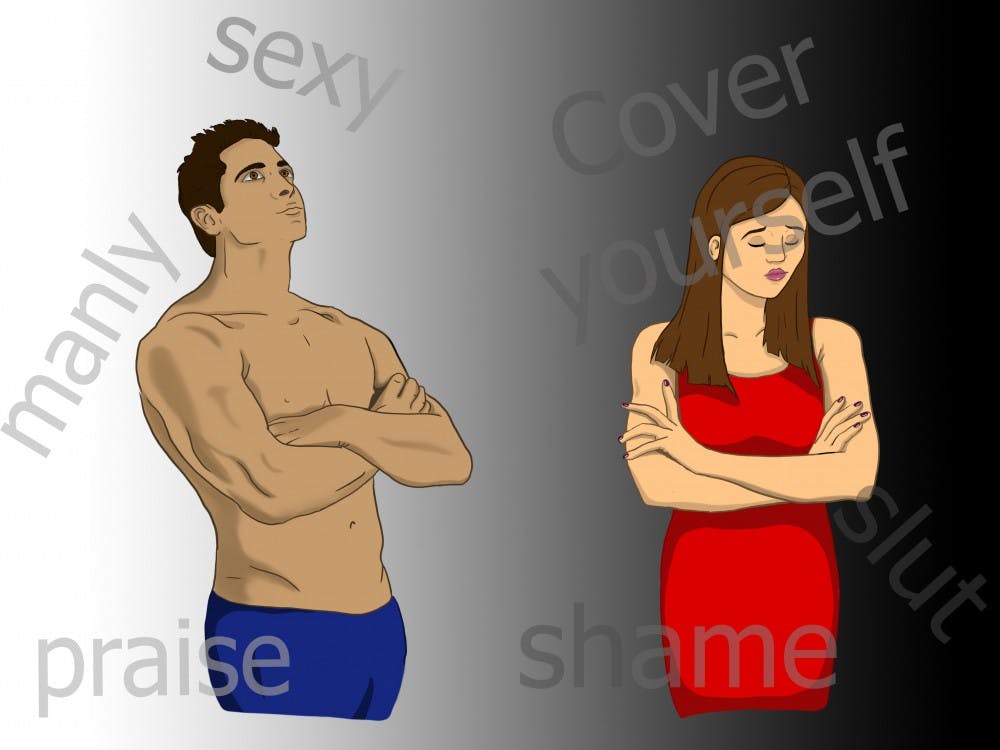College is a significant time for sexual development. It’s a time where ideas and values about sexuality are shaped. The development that takes place during these years is crucial to the health of our sex lives.
We tend to draw our ideas about sex from the media, where a clear sexual double standard exists. The media’s portrayal of women’s sexualities is destructive and plays a major role in our culture's negative perspective of sex.
In the media, sex is generally defined by the male. If he orgasms the act is considered sex, but if the sexual act is only performed on the woman it's not necessarily defined as “sex.” It’s also commonplace for there to be little to no foreplay portrayed in film and TV — sex is almost always penetrative, where both partners finish at the same time.
This sets unrealistic assumptions, especially for women. Most women need some form of foreplay to climax. It also takes most women longer to orgasm than their male partner. This sets up seriously unhealthy expectations for women in the bedroom.
“It (the media) impacts what we think of as normal and how we respond to the sexualities of those around us,” Kellie Herson, an MA and Gender Studies Ph.D Candidate at ASU, said. “It not only encourages people to internalize particular kinds of shame, but it encourages people to shame others for any kind of sexual expression outside what is portrayed as 'normal' in our popular culture.”
Many women believe that if they don't climax before or at the same time as their partner, something is wrong with them. They’ll likely begin to feel embarrassed because they aren't complying with the expectation set forth by the male dominated media. As a result many girls simply accept the fact that they aren't satisfied, rather than communicating with their partner.
The MPAA tends to rate films where a woman is clearly enjoying sex as more explicit than if it were a man.
For example Gone Girl depicts a scene where Nick Dunne performing cunnilingus on his wife, Amy. This movie was given an R rating for a scene that would have received a rating of PG-13 if the roles were reversed.
Similarly, in Blue Valentine, Dean performs oral sex on Cindy. The MPAA tried to give the film an NC-17 rating for this scene.
However, in What’s Eating Gilbert Grape, Betty performs the same act on Gilbert, and the scene was rated PG-13.
All three scene feature little to no nudity. The only factor that changed was the gender of the person receiving oral sex. There is no denying the double standard here.
This sends a message to women that their sexualities are more explicit than men’s. It instills the idea that it’s perfectly normal and healthy for men to enjoy sex, but for women it’s wrong and immoral.
The media continuously presents women’s sexuality through the male gaze. Women are seen as a tool to "get a man off." Sex in the media is often solely focused on male pleasure. If the woman orgasms it's a plus, but if she doesn't it's no big deal.
It also has a lot to say about how we view women in media. The male gaze is central to the narrative and is both challenged and reaffirmed.
— David Monaghan (@IndefiniteDavid) December 15, 2016
This reinforces the idea that men are inherently more sexual than women, which isn't true. It teaches young women to stifle their sexualities. The media is sending a message that “good girls don’t enjoy sex.”
We need to be intentional about making sure our ideas about sexuality aren’t shaped by the media. In order to sustain healthy sexualities we need to open up a dialogue about what you can actually expect from sex. Shaping our sexualities from the media will only contribute to a misogynistic and sex negative culture.
Reach the columnist at sljorda4@asu.edu or follow @skyjordan4 on Twitter.
Editor’s note: The opinions presented in this column are the author’s and do not imply any endorsement from The State Press or its editors.
Want to join the conversation? Send an email to opiniondesk.statepress@gmail.com. Keep letters under 300 words and be sure to include your university affiliation. Anonymity will not be granted.
Like The State Press on Facebook and follow @statepress on Twitter.




